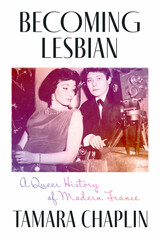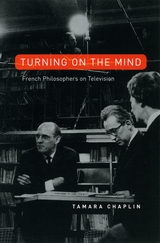2 books about Chaplin, Tamara

Becoming Lesbian
A Queer History of Modern France
Tamara Chaplin
University of Chicago Press
A landmark analysis of how a marginalized subculture used modern media to transform public attitudes toward sexual desire.
In Becoming Lesbian, historian Tamara Chaplin argues that the history of female same-sex intimacy in France is central to understanding the struggle to control the public sphere in the twentieth century. This monumental study draws on a wide range of undiscovered sources from cabaret culture, sexology, police files, radio and TV broadcasts, photography, the Minitel (an early form of internet), and private letters, as well as over one hundred interviews that Chaplin conducted with women from France and its colonies. Becoming Lesbian demonstrates how women of diverse classes and races came to define themselves as lesbian and used public spaces and public media to exert claims on the world around them in ways that made possible new forms of gendered and sexual citizenship. Chaplin begins in the sapphic cabarets of interwar Paris. These venues, as she shows, exploited female same-sex desire for profit while simultaneously launching an incipient queer female counterpublic. Refuting claims that World War II destroyed this female world, Chaplin reveals instead how sapphic subcultures flourished into the postwar period, laying crucial groundwork for the collective politicization of lesbian identity in the decades that followed.
Becoming Lesbian brims with colorful vignettes about female cabaret owners, singers, TV personalities, writers, and lesbian activists, all of whom Chaplin brings to life to make larger points about rights, belonging, and citizenship. As a history of lesbianism, this book represents a major contribution to modern French history, queer studies, and genealogies of the media and its publics.
In Becoming Lesbian, historian Tamara Chaplin argues that the history of female same-sex intimacy in France is central to understanding the struggle to control the public sphere in the twentieth century. This monumental study draws on a wide range of undiscovered sources from cabaret culture, sexology, police files, radio and TV broadcasts, photography, the Minitel (an early form of internet), and private letters, as well as over one hundred interviews that Chaplin conducted with women from France and its colonies. Becoming Lesbian demonstrates how women of diverse classes and races came to define themselves as lesbian and used public spaces and public media to exert claims on the world around them in ways that made possible new forms of gendered and sexual citizenship. Chaplin begins in the sapphic cabarets of interwar Paris. These venues, as she shows, exploited female same-sex desire for profit while simultaneously launching an incipient queer female counterpublic. Refuting claims that World War II destroyed this female world, Chaplin reveals instead how sapphic subcultures flourished into the postwar period, laying crucial groundwork for the collective politicization of lesbian identity in the decades that followed.
Becoming Lesbian brims with colorful vignettes about female cabaret owners, singers, TV personalities, writers, and lesbian activists, all of whom Chaplin brings to life to make larger points about rights, belonging, and citizenship. As a history of lesbianism, this book represents a major contribution to modern French history, queer studies, and genealogies of the media and its publics.
[more]

Turning On the Mind
French Philosophers on Television
Tamara Chaplin
University of Chicago Press, 2007
In 1951, the eight o’clock nightly news reported on Jean-Paul Sartre for the first time. By the end of the twentieth century, more than 3,500 programs dealing with philosophy and its practitioners—including Bachelard, Badiou, Foucault, Lyotard, and Lévy—had aired on French television. According to Tamara Chaplin, this enduring commitment to bringing the most abstract and least visual of disciplines to the French public challenges our very assumptions about the incompatibility of elite culture and mass media. Indeed, it belies the conviction that television is inevitably anti-intellectual and the quintessential archenemy of the book.
Chaplin argues that the history of the televising of philosophy is crucial to understanding the struggle over French national identity in the postwar period. Linking this history to decolonization, modernization, and globalization, Turning On the Mind claims that we can understand neither the markedly public role that philosophy came to play in French society during the late twentieth century nor the renewed interest in ethics and political philosophy in the early twenty-first unless we acknowledge the work of television. Throughout, Chaplin insists that we jettison presumptions about the anti-intellectual nature of the visual field, engages critical questions about the survival of national cultures in a globalizing world, and encourages us to rethink philosophy itself, ultimately asserting that the content of the discipline is indivisible from the new media forms in which it has found expression.
[more]
READERS
Browse our collection.
PUBLISHERS
See BiblioVault's publisher services.
STUDENT SERVICES
Files for college accessibility offices.
UChicago Accessibility Resources
home | accessibility | search | about | contact us
BiblioVault ® 2001 - 2024
The University of Chicago Press









